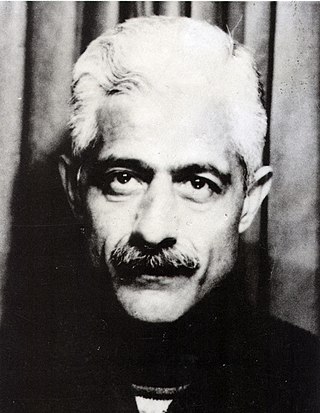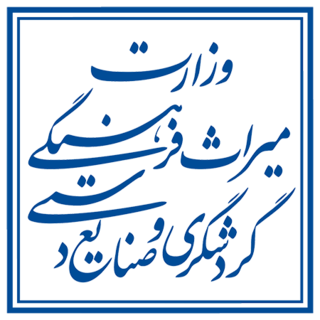Related Research Articles
Anthropology is the scientific study of humanity, concerned with human behavior, human biology, cultures, societies, and linguistics, in both the present and past, including archaic humans. Social anthropology studies patterns of behavior, while cultural anthropology studies cultural meaning, including norms and values. The term sociocultural anthropology is commonly used today. Linguistic anthropology studies how language influences social life. Biological or physical anthropology studies the biological development of humans.

The University of Tehran is a Collegiate university and the oldest and most prominent Iranian university located in Tehran, Iran. Based on its historical, socio-cultural, and political pedigree, as well as its research and teaching profile, UT has been nicknamed "The Mother University [of Iran]". It is also the premier knowledge producing institute among all OIC countries. The university offers more than 111 bachelor's degree programs, 177 master's degree programs, and 156 PhD. programs. Many of the departments were absorbed into the University of Tehran from the Dar al-Funun established in 1851 and the Tehran School of Political Sciences established in 1899.

Seyyed Jalāl Āl-e-Ahmad was a prominent Iranian novelist, short-story writer, translator, philosopher, socio-political critic, sociologist, as well as an anthropologist who was "one of the earliest and most prominent of contemporary Iranian ethnographers". He popularized the term gharbzadegi – variously translated in English as "westernstruck", "westoxification", and "Occidentosis" – producing a holistic ideological critique of the West "which combined strong themes of Frantz Fanon and Marx".

Arjun Appadurai FRAI is an Indian-American anthropologist who has been recognized as a major theorist in globalization studies. He is an elected fellow of the Royal Anthropological Institute of Great Britain and Ireland. In his anthropological work, he discusses the importance of the modernity of nation-states and globalization. He is the former professor of anthropology and South Asian Languages and Civilizations at the University of Chicago, Humanities Dean at the University of Chicago, director of the Center on Cities and Globalization at Yale University, provost and senior vice president for Academic Affairs at The New School, and professor of education and human development studies at New York University's Steinhardt School. He is currently professor emeritus of the Media, Culture, and Communication Department in the Steinhardt School.
Hossein Mohyeddin Ghomshei is an Iranian scholar, philosopher, author, and lecturer on literature, art, and mysticism.

Mazandarani is an Iranian language of the Northwestern branch spoken by the Mazandarani people. As of 2021, there were 1.36 million native speakers. The language appears to be decreasing, as it is threatened, and due to the majority of its speakers shifting to Iranian Persian. As a member of the Northwestern branch, etymologically speaking, it is rather closely related to Gilaki and also related to Persian, which belongs to the Southwestern branch. Though the Persian language has influenced Mazandarani to a great extent, Mazandarani still survives as an independent language with a northwestern Iranian origin.

The Ministry of Cultural Heritage, Tourism and Handicrafts of Iran is an educational and research institution overseeing numerous associated museum complexes throughout Iran. It is administered and funded by the Government of Iran. It was first established in 1985 by legislation from the Majlis merging 11 research and cultural organizations. In 2019, the Iranian Cultural Heritage, Handicrafts and Tourism Organization (ICHHTO) was converted into the Ministry. The current Minister is Reza Salehi Amiri Since 21 August 2024.
Intellectual movements in Iran involve the Iranian experience of modernity and its associated art, science, literature, poetry, and political structures that have been changing since the 19th century.

Hamid Mowlana is an Iranian-American author and academic. He is professor emeritus of international relations in the School of International Services at American University in Washington, D.C. He was an advisor to the former Iranian President Mahmoud Ahmadinejad.
Michael M. J. Fischer is Andrew W. Mellon Professor in the Humanities and Professor of Anthropology and Science and Technology Studies at the Massachusetts Institute of Technology, and Lecturer in the Department of Global Health and Social Medicine, Harvard Medical School.
Jamshid Behnam was an Iranian sociologist, writer, and translator. He is known for his work in the development of sociology and modernization in 20th century–Iran. He was a published author of books on Demographics, Sociology of Iran, Family Structure, and Modernity.

Vladimir Fyodorovich Minorsky was a White Russian academic, historian, and scholar of Oriental studies, best known for his contributions to the study of history of Iran and the Iranian peoples such as Persians, Lurs, and Kurds in addition to the Kartvelian Laz people.

Khosrow Bagheri Noaparast is an Iranian philosopher, educational theorist and the president of Philosophy of Education Society of Iran (PESI).
Nayereh Esfahlani Tohidi is an Iranian-born American professor, researcher, and academic administrator. Tohidi is a professor emerita and former chair of gender and women’s studies, and the founding director of the Middle Eastern and Islamic studies at California State University, Northridge.

Ali-Asghar Hekmat-e Shirazi, or Mirza Ali-Asghar Khan-e Hekmat-e Shirazi, was an Iranian politician, diplomat and author who served as the Iranian minister of foreign affairs, minister of justice, and minister of culture under the government of Reza Shah and Mohammad Reza Pahlavi, the Shahs of Iran. Hekmat was an Iranian ambassador to India and wrote multiple books about Indian history and culture. After the Islamic revolution in Iran, his books and works were ignored and he was labelled as a Freemason, but one of his books, Persian Inscriptions on Indian Monuments, was reprinted and introduced to Iranians.
Farideh Heyat is a British-Iranian anthropologist and a writer based in London. She is a retired lecturer of SOAS, University of London and American University of Central Asia in Bishkek. Heyat is the author of numerous articles on women in Azerbaijan and Kyrgyzstan. She is also the author of the following books: Azeri Women in Transition: Women in Soviet and post-Soviet Azerbaijan and The Land of Forty Tribes.
Roxanne Varzi is an Iranian-born American cultural anthropologist, filmmaker, sound artist, writer, playwright, and educator. She is a full professor of anthropology and film and media studies at University of California, Irvine (UCI). Varzi is known for her various works in media, including books, film documentaries, sound performances, and theatrical plays.
Post-Islamism is a neologism in political science, the definition and applicability of which is disputed. Asef Bayat and Olivier Roy are among the main architects of the idea.

Ali Asghar Mosleh Fasaei is an Iranian philosopher and professor of philosophy at Allameh Tabataba'i University. He is known for his expertise on philosophy of culture. Mosleh holds the presidency of The Iranian Society of Intercultural Philosophy (ISIPH) and Research Institute for Contemporary Culture at Institute for Humanities and Cultural Studies. He was the Dean of ATU's Faculty of Persian Literature and Foreign Languages (PLFL), and Acting-Dean of ATU's Faculty of Theology and Islamic Knowledge (2015-2017). He is associate member of the Iranian Academy of Science. (2023)

Abdollah Guivian is an Iranian writer and sociologist whose work focuses on anthropology of religion, media studies and Iranian Armenians. He was the founding editor of the journal Communication Research. Guivian is credited as the "father of video clips in Iran". Abdollah Guivian holds a PhD in anthropology and communication in 2006 and is a Professor of Iran Broadcasting University.
References
- ↑ "مرجع مقالات، بهترین مرجع مقالات دانشگاهی و دانشجویی".
- ↑ "Dr Nematallah Fazeli : SOAS". www.soas.ac.uk. Archived from the original on 21 April 2008.
- ↑ "Dr. Nematollah Fazeli :Tourism is not playfulness". Iranian Students' Tourism & Travelling Agency.
- ↑ Fischer, Michael M. J. (2007). "NEMATOLLAH FAZELIPolitics of Culture in Iran: Anthropology, Politics, and Society in the Twentieth Century (New York: Routledge/BIPS Persian Studies Series, 2006). Pp. 260. 115.00 cloth". International Journal of Middle East Studies. 39: 123–125. doi:10.1017/S0020743807212565. S2CID 154553615.
- ↑ Mahdavi, Shireen (2007). "Iran, Revolution, Intellectuals and Women". British Journal of Middle Eastern Studies. 34 (3): 399–406. doi:10.1080/13530190701727704. JSTOR 20455537. S2CID 159925638.